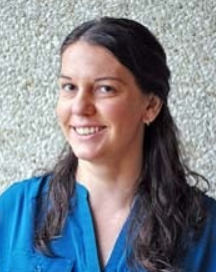
Dr. Maggie Wagner joined the KU Kansas NSF EPSCoR RII Track-1 Award OIA-1656006: Microbiomes of Aquatic, Plant, and Soil Systems across Kansas (MAPS) Plants Team in Fall of 2019 as an assistant professor of Ecology and Evolutionary Biology. Her research focuses on the genetic basis of plants’ interactions with their microbial neighbors in both natural and agricultural systems. She uses quantitative genetics and evolutionary ecology to study the health of crops and wild plants facing environmental challenges. She received a Kanas NSF EPSoR First Award that began in the Fall of 2019 and this past spring was awarded a BBSRC-NSF/BIO Award titled: A holistic approach to understand drought adaptation in plants, their symbionts, and free-living microbiome. The project is a collaboration between the University of Kansas and the University of Nottingham.
The project is a collaboration between the University of Kansas and the University of Nottingham. The award will support three years of research investigating the interactions and impacts involved in the relationship between plants and the microbes they depend on. In particular, the project will focus on identifying how plants and their microbes respond to drought conditions. Dr. Wagner’s collaboration partner, Dr. Gabriel Castrillo of the University of Nottingham will perform scans of the root systems of corn plants and their microbiomes under challenging conditions.
The following is an excerpt from her abstract:
“For decades, it has been clear that soil microbes strongly affect plant health. For this reason, plant microbiomes which mostly come from soil have great potential to help improve agricultural productivity and restore damaged ecosystems. Because microbiomes are so complex, it is unclear how and why they affect plants. Part of the answer may lie in the evolutionary histories of plants and their microbiomes, which share a habitat and therefore must adapt to the same environmental stresses, such as drought. The research funded by this award will test the hypotheses that (1) drought-adapted soil microbiomes help plants tolerate drought, and (2) drought-adapted plants help soil microbes survive drought. DNA sequencing will be used to identify differences in drought-adapted versus non-adapted soil microbiomes. Then, physiological and biochemical techniques, such as CT-scanning of root structures, will reveal the effects of those drought-adapted and non-adapted microbiomes on plant health. These experiments will be done using both corn and Eastern Gamagrass, a native species. This research has the potential to improve current methods for predicting the effects of soil microbes on plant health, and thus impact agriculture and conservation practices.”
In addition, Dr. Wagner will be joining the MAPS Microbes on the Move pop-up museum and assist with efforts to translate the museum’s handouts and activities into Spanish.
To read more about the award click here
